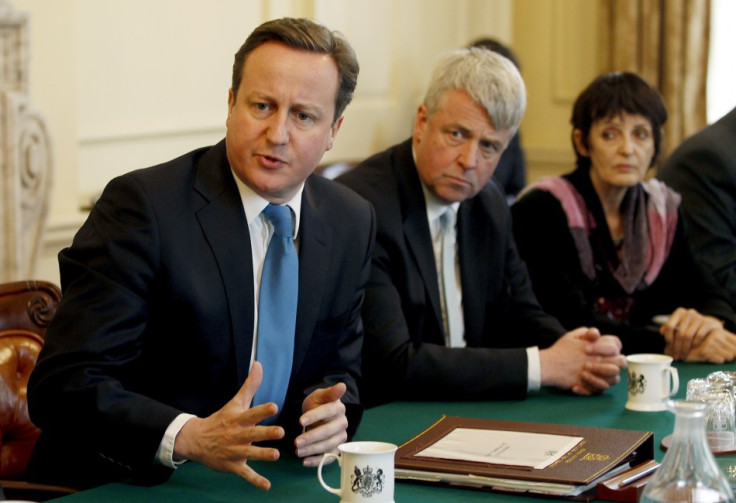NHS Reforms: Ultimate Guide to Andrew Lansley's Health Plan

The battle over the coalition government's proposed NHS reforms has been lengthy and passionate, but for many outside the health service the facts remain unclear.
International Business Times UK attempts to clear the muddy waters to see how the Health and Social Care Bill may affect the health service - and David Cameron's re-election hopes.
Clinically Led Commissioning
The change in commissioning duties represents the bill's most significant alteration to the running of the NHS.
Heathcare is commissioned, or bought in, by regional Primary Care Trusts (PCTs), which manage their own budgets and priorities. Their budgets are set by Strategic Health Authorities (SHAs), which answer to the Department of Health.
The bill proposes the dissolution of the trusts and authorities and replacing them with Clinically led Commissioning Groups (CCGs) - the majority of which will be led by GPs.
These CCGs will take control of about 80 percent of the NHS budget, representing around £80bn a year. They will operate under an independent NHS Commissioning Board, which will oversee their budget and strategy.
- The Argument For:
The Department of Health argues that the changes to commissioning will cut down on the layers of bureaucracy that it believes hampers the provision of care.
It argues: "GPs are ideally suited to lead on commissioning based on their understanding of the needs of their patients and local communities."
The government's position is that the change will increase efficiency while cutting costs and improving results for patients.
- The Argument Against:
Although they have years of medical experience to draw from, the majority of GPs have no experience when it comes to handling commissioning duties.
This leads to the expectation that they would buy in support, which could come in the form of PCT and SHA staff left adrift by the changes, but is most likely to go to the private sector.
Concerns have been raised that the redistribution of the PCTs' responsibilities aside from commissioning are disorganised and will lead to an increase in bureaucracy.
GPs themselves have turned against the bill. A recent poll showed 98 percent opposition amid claims that they were "duped" into support without realising its full implications.
A further blow came in the form of Tower Hamlets Clinical Commissioning Group's letter to Cameron in opposition, claiming clinical commissioning could be increased without the need of the "bureaucracy generated by the bill".
Competition
One of the most controversial aspects of the bill comes in its aims to increase competition to the delivery of services and save money.
Commissioners will be given the freedom to take decisions on the use of choice and competition for services, overseen by independent moderator Monitor.
- The Argument For
The Department of Health claims that an increase in competition will deliver the best service and the best value for money.
Its position was supported by the thinktank Reform, which claimed that increased competition can cut hospital admissions and costs.
Deputy Prime Minister Nick Clegg announced a number of amendments to the bill in order to ensure that "competition should only be on quality, not on price", while stressing the need to "rule out beyond doubt any threat of a US-style market in the NHS".
Health secretary Andrew Lansley revealed that there would be further amendments to the bill, telling the BBC that "competition is a means to an end, not an end in itself".
During Prime Minister's Questions on Wednesday, Cameron quoted Labour's former senior policy advisor Julian LeGrand as saying: "The introduction of competition in the NHS could be credited with saving hundreds of lives."
- The Argument Against:
The opposition to increased competition was put to Lansley in its purest terms by protesters outside Downing Street. Increased competition is seen as leading towards privatisation of the NHS as it inherits the attributes of a trading market.
Concerns have also been raised that a lack of strong controls could simply see the private sector "cream-skimming" the easiest patients to treat.
Pressure group 38 Degrees claims the bill will provide "fertile ground" for legal challenges from private health providers, who can take costly action against commissioning decisions that did not fall their way.
It also warns that the bill could open up the NHS to UK and EU competition law in much the same way as utilities such as electricity or gas are regulated.
The dispute on competition and "patients vs profits" is one of perspective and ethics as well as economy. Protesters do not want to see healthcare move closer to a status as a commodity as they do not believe profitability and quality of care can sufficiently intertwine.
What Next?
The bill has already seen more than 1,000 amendments as it fights its way through the two houses and it appears more are due to follow.
It would seem Cameron has his heart set on the bill, as calls from the British Medical Association, Royal College of Nurses and many other branches of the health service for it to be scrapped have met stoic resistance.
Cameron even quoted former Labour PM Tony Blair earlier this month claiming that "opposition is inevitable, but it's rarely unbeatable".
Pre-emptive reorganisation throughout the NHS, including the "clustering" of PCTs has left the service in a position where it apparently cannot turn back.
Cameron's new attack position has seen him claim that the coalition is merely building on the Labour government's work with the NHS.
"They used to support freedom and choice for patients. They don't seem to do so any more," he said.
The future of the health bill and NHS is far from decided, but as Lord Owen hinted to Labour, its resolution could prove to be a deciding force in the next general election.
© Copyright IBTimes 2025. All rights reserved.





















